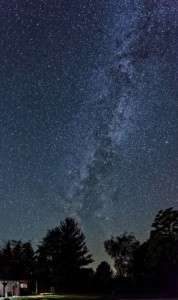The last meteor shower of the year will span from the 17th through the 25th, though it will peak overnight on the 22nd with about 10 sightings per hour. Because the shower’s peak coincides with the new moon, it should be a great time to view the meteors and close up a fantastic year of skywatching. These meteors will appear to originate from the Ursa Minor constellation.
Public Night @ Sky Meadows – Check http://www.novac.com/wp/observing/sky-meadows/ for site details and directions.
NOTE: There is no admittance to Sky Meadows State Park after 6:30pm! Even if the event goes later.
The Quadrantids meteor shower can yield as many as 40 meteors per hour, radiating from the constellation Bootes. Visibility will be reduced on account of a bright second quarter Moon, but you may be able to spot a few during the night… Begin the new year by looking up!
Jupiter is sure to delight all who view it, from professional observatories to amateurs with handheld binoculars. Make sure to check out its four Galilean moons and see if you can make out colorful cloud bands or the Great Red Spot. If you’ve ever considered dabbling in planetary imaging, tonight (adjacent to a dark new moon) would be the perfect night to start!
Smack dab on the new moon, this promises to be nice dark viewing. These shooting stars are composed of the remnants of Comet Halley. Meteors—up to 30 per hour in the Northern Hemisphere and 60 per hour in the Southern—will appear to radiate from Aquarius.
The Quadrantids meteor shower can yield as many as 40 meteors per hour, radiating from the constellation Bootes. It peaks this year on the night of the 3rd and morning of the 4th. The first quarter moon will set shortly after midnight leaving fairly dark skies for what could be a good show. Best viewing will be from a dark location after midnight. Begin the new year by looking up!
The Leonids is an average shower, producing up to 15 meteors per hour at its peak. This shower is unique in that it has a cyclonic peak about every 33 years where hundreds of meteors per hour can be seen. That last of these occurred in 2001. The Leonids is produced by dust grains left behind by comet Tempel-Tuttle, which was discovered in 1865. The shower runs annually from November 6-30. It peaks this year on the night of the 17th and morning of the 18th. The nearly new moon will not be a problem this year. Skies should be dark enough for what should be good show. Best viewing will be from a dark location after midnight. Meteors will radiate from the constellation Leo, but can appear anywhere in the sky.
The Quadrantids meteor shower can yield as many as 40 meteors per hour, radiating from the constellation Bootes. It peaks this year on the night of the 3rd and morning of the 4th. Bummer though: this will occur during a nearly full moon, so all but the brightest meteors will be washed out. Still, looking up at the sky isn’t a bad way to start the new year!

Join NOVAC and the Rappahannock County Park for a public observing session.
Audience: Members of the public, astronomy club members. Feel free to bring along any friends and family.
Volunteer Role: Bring binoculars or a telescope to share views of the planet Mars, galaxies and other deep sky objects.
Presentations:
- NOVAC member will p a 15-minute presentation by NOVAC member on how to find Mars, the M-44 beehive cluster and the M-104 Sombrero Galaxy in Virgo.
- short educational presentation put on by the Park stressing the value of maintaining a light pollution free environment.
Masks:
- not mandatory before dark unless social distancing cannot be maintained.
- required after dark.
Contact: RSVP to Torney Van Acker, Dark Sky Coordinator, at 703-250-7943 or torney630@gmail.com.

